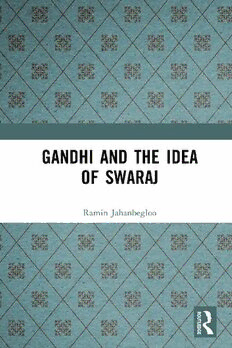
Gandhi and the Idea of Swaraj PDF
Preview Gandhi and the Idea of Swaraj
GANDHI AND THE IDEA OF SWARAJ This book examines Gandhi’s idea of swaraj as an alternative to the modern concept of political authority. It also introduces the readers to Gandhi’s ideas of moral interconnectedness and empathetic pluralism. It explores the Gandhian belief that “nonviolence” as a moral and political concept is essentially the empowerment of the Other through spiritual and political realization of the self as a non-egocentric subject. Further, it highlights swaraj as an act of conscience and therefore a transformative force, essential to the harmony between spirituality and politics. The volume will be of great interest to scholars and researchers of philosophy, politics, and South Asian studies. Ramin Jahanbegloo is an Iranian–Canadian philosopher. He is presently the executive director of the Mahatma Gandhi Centre for Nonviolence and Peace Studies and the vice-dean of the School of Law at Jindal Global University, Sonipat, India. He is the winner of the Peace Prize from the United Nations Association in Spain (2009) for his extensive academic work in promoting dialogue among cultures and his advocacy for nonviolence. More recently, he is the winner of the Josep Palau i Fabre International Essay Prize. Some of his most recent publications are Gadflies in the Public Space (2016), The Decline of Civilization (2017), Letters to a Young Philosopher (2017), On Forgiveness and Revenge (2017), and The Global Gandhi: Essays in Comparative Political Philosophy (2018). GANDHI AND THE IDEA OF SWARAJ Ramin Jahanbegloo First published 2023 by Routledge 4 Park Square, Milton Park, Abingdon, Oxon OX14 4RN and by Routledge 605 Third Avenue, New York, NY 10158 Routledge is an imprint of the Taylor & Francis Group, an informa business © 2023 Ramin Jahanbegloo The right of Ramin Jahanbegloo to be identified as author of this work has been asserted in accordance with sections 77 and 78 of the Copyright, Designs and Patents Act 1988. All rights reserved. No part of this book may be reprinted or reproduced or utilised in any form or by any electronic, mechanical, or other means, now known or hereafter invented, including photocopying and recording, or in any information storage or retrieval system, without permission in writing from the publishers. Trademark notice: Product or corporate names may be trademarks or registered trademarks, and are used only for identification and explanation without intent to infringe. British Library Cataloguing-in-Publication Data A catalogue record for this book is available from the British Library Library of Congress Cataloging-in-Publication Data A catalog record has been requested for this book ISBN: 978-1-032-40399-1 (hbk) ISBN: 978-1-032-43262-5 (pbk) ISBN: 978-1-003-36649-2 (ebk) DOI: 10.4324/9781003366492 Typeset in Sabon by Deanta Global Publishing Services, Chennai, India TO LORD BHIKHU PAREKH IN RESPECT AND FRIENDSHIP CONTENTS Introduction: Experimenting with Truth: The Nobility of Spirit 1 1 Politics with Conscience: Parrhesia and Maturity 15 2 Swaraj: Empathetic Emancipation and Common Humanity 29 3 Satyagraha: Socratic Self-Examination and Nonviolent Citizenry 43 4 Anti-political Politics and Integral Democracy 57 5 The Care of the World and Moral Obligation to Disobey 71 Conclusion: Spirituality of Emancipation and the Otherness of the Other 85 Bibliography 99 Index 103 vii 10.4324/9781003366492-1 INTRODUCTION Experimenting with Truth: The Nobility of Spirit The history of the world is but the biography of prominent men and women who dared to change our destiny. As a matter of fact, when we look at the past hundred years of human history, we can conclude that today’s world would have been different in a very significant way if a figure by the name of Mohandas Karamchand Gandhi had not existed. What we owe Gandhi is beyond evaluation. Not only because of his strong and unimpeachable moral character, which mobilized millions of Indians to fight for their freedom without using violence. But also because he inspired many others powerfully and showed them the way of nonviolent resistance against injustice, hatred, and spirit of vengeance. Never before in history was an indi- vidual so universally acknowledged in his lifetime as the embodiment of righteousness and truth. Gandhi was more than just the Indian independence leader he is remembered as today. He was one of the world’s greatest political thinkers, whose life was founded on deep moral and spiritual convictions. More than being just the father of the Indian nation, Mahatma Gandhi inspired millions of people around the globe as an apostle of peace and nonviolence. Undoubtedly, with- out Gandhi, the concept of “nonviolence” would not have acquired a general use in the global resistance against injustice. In that respect, Gandhi turned the religious concept of ahimsa (non-harm), common to Eastern religions like Buddhism, Hinduism, and Jainism, into a political tool for mass resistance. In a way we can say that Gandhi updated the old notion of ahimsa by making it relevant to the urgent problems of the modern world. As B.R. Nanda argues, Gandhi’s great achievement was to evolve and practise a non-violent method for conflict resolution at the beginning of the twentieth century, which proved to be the most violent DOI: 10.4324/9781003366492-1 1
